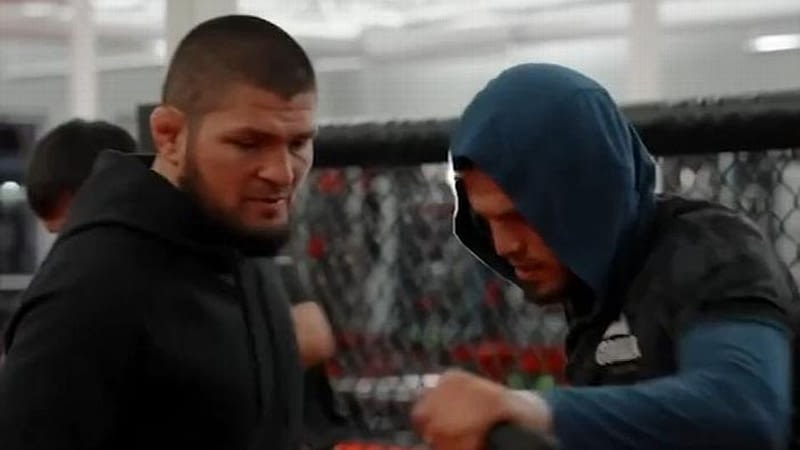The Legacy of Abdulmanap Nurmagomedov: A Story of Sacrifice and Success
Welcome to the world of mixed martial arts, where the name Nurmagomedov is synonymous with excellence, discipline, and sacrifice. As we step into the new year, Khabib Nurmagomedov finds himself in a familiar setting, albeit far from the comforts of his home in Dagestan. It’s January 1st, and Khabib is seated on a wrestling mat at the UFC Performance Institute in Las Vegas, drenched in sweat after a grueling two-hour practice session. For Khabib, this is three weeks too long away from home.
“I don’t like this, to be honest,” Khabib admits, expressing his preference for the simplicity and privacy of his home over the bright lights of Las Vegas. “Why anyone like this?”
Surrounding Khabib on the mat is a group of 20 fighters, including UFC champion Islam Makhachev and UFC title challenger Umar Nurmagomedov. Among them are several undefeated MMA fighters, a Muay Thai world champion, and a silver medalist Olympic wrestler. This formidable team is arguably the greatest in the history of combat sports, and their focus is squarely on Khabib.
“It’s not my job to say you are perfect,” Khabib tells them, listing improvements they need to make. “I’m here to make you better.”
The Legacy of Abdulmanap Nurmagomedov
For over 30 years, the responsibility of coaching this team rested on the shoulders of Khabib’s father, Abdulmanap Nurmagomedov. He was the founder and lifeblood of the team, assembling its core when they were children in Sildi, a small mountain village in Dagestan. Abdulmanap’s legacy will be on full display at UFC 311 this weekend in Inglewood, California. Makhachev (26-1) will defend his lightweight title against Arman Tsarukyan in the main event at Intuit Dome. Umar (18-0), Khabib’s cousin, will challenge bantamweight champion Merab Dvalishvili in the co-main event. Another team member, flyweight Tagir Ulanbekov (15-2), could achieve a top-10 ranking with a win in the prelims.
Sadly, Abdulmanap will not witness this historic night. The legendary coach passed away at 57 in 2020 due to complications from COVID-19. Khabib retired from active competition shortly after and took on his father’s role as coach. However, he is ready for a different chapter in his life, serving his father’s team out of a sense of responsibility rather than desire.
The Weight of Responsibility
Coaching at a championship level is always a heavy responsibility, but for Khabib, it runs deeper. He is the only one who can carry his father’s plan to completion, a task made more difficult by the absence of Abdulmanap. “When Khabib’s father passed, he wanted nothing to do with MMA — that piece of his heart almost died,” says Ali Abdelaziz, Khabib’s longtime manager and friend. “And now, it’s like reminding him of his father everywhere he goes, every gym, every workout. He has to become his father, right? And he doesn’t want this, because he would prefer his father was still here — and he could stand behind him.”
Abdulmanap’s Coaching Philosophy
Abdulmanap Nurmagomedov was born to coach. Growing up in a rural Dagestani village in the 1960s, he devoted himself to studies and freestyle wrestling. At 18, he joined the Russian military, where he learned sambo and judo. His coaches were “old school,” instilling a serious intensity in Abdulmanap’s training, which he passed on to his students.
“He was very disciplined,” Khabib recalls. “He came back to our village and began training the youth in 1985, and kept training until his last days. And some people, they learn things but there is no discipline. There is no energy. There is no knowledge. He was very educated, and he used to tell all of us that we had to be educated. So many things came together [for him as a coach].”
Abdulmanap’s grappling style, now recognized worldwide, allowed Khabib to go 29-0, creating viral moments like talking to Dana White cageside during a fight in New York while controlling his opponent. Khabib’s technique dominated Conor McGregor in a submission win in 2018, one of the most-watched fights in UFC history.
The Power of Sacrifice
The core group of Khabib, Makhachev, Umar Nurmagomedov, and Bellator MMA lightweight champion Usman Nurmagomedov have a combined record of 91-1. “I can describe this in one word: sacrifice,” Khabib says of his team’s success. “People talk about discipline, but sometimes discipline is not enough. If you want to become the best, there is no family. If you want to spend time with your family and kids, be with them. You’re going to become the best family man, and I am not against family people.”
- “If you want to become the best in this business, you have to sacrifice. Sacrifice your time, sacrifice your health, sacrifice everything you have.”
Khabib’s sacrifice as a fighter ended in 2020 after defending his UFC lightweight championship for the third time. He was on top of the MMA world, widely considered the No. 1 pound-for-pound fighter, but he could not continue without his father. He took over Abdulmanap’s role as coach, guiding Makhachev to the UFC’s 155-pound championship with a win over Charles Oliveira in October 2022. After that fight, Khabib tried to walk away, stopping cornering his fighters and publicly stating he had no intention of doing so again. The fight world felt his departure, but the team felt it more. Abdulmanap was a memory, and now, so was his son.
“When he said he wasn’t going to corner the guys, I felt sad because we need him, you know?” says American Kickboxing Academy head coach Javier Mendez. “We need his presence. He’s meant to lead these guys. And they missed him. His presence is huge for their morale.”
An entire year passed, and Khabib kept his distance from the sport. In October 2023, after Makhachev defended his title against Alexander Volkanovski without Khabib in his corner, Khabib wrote on Instagram, “If you guys ask me where have I been? Why I wasn’t in the corner, I already answered this question. … I completely left everything related to MMA. I ask you to accept my decision.”
The team continued to do well without Khabib’s presence. Makhachev defended his belt twice, Umar continued to stack wins, and Usman won his title in Bellator MMA. But it wasn’t the same. The group had grown up together in the gym, training with Khabib. It wasn’t the same without him.
As time went on, Khabib couldn’t hide from that reality. He tried to give input from a distance but realized it was impossible. Championship fights come down to the fine details, won or lost in the training room, not inside the Octagon. After that realization, Khabib returned to the team ahead of Makhachev’s last title defense against Dustin Poirier at UFC 302. Khabib was in Makhachev’s corner for that fight. The team’s goal is perfection, and perfection requires sacrifice.
“Sometimes, what you think is going to be the best ends up wrong,” Khabib says. “It was more stressful to be away. I want to be with my kids, but I have to share my knowledge with my brothers, because when I was on my way to becoming champion, they were with me, you know? I have to be here.”
The Future of the Team
Makhachev, who has followed in Khabib’s footsteps as the UFC’s lightweight champion and the No. 1 pound-for-pound fighter, has trained within Abdulmanap’s system his entire life. The system remains intact in 2025, although there are slight variations under Khabib’s leadership.
For instance, Makhachev recalls grappling practices with multiple high-intensity, five-minute rounds, broken by one-minute rests. Under Khabib, he sometimes grapples a round three times as long. “I stopped him and was like, ‘Hey, man, I training with you all my life, I don’t remember when we grappled for 15 minutes nonstop,'” Makhachev recalls with a laugh. “‘We have rules. One and a half hours of training and it’s finished. You have to follow the rules.’ And [Coach Mendez] won’t stop him. He says, ‘This guy loves you and wants you to be in the cage 100 percent.’ And I understand and just listen to him.”
Other than the uptick in intensity, Khabib’s coaching style is nearly identical to his father’s. Tardiness to practice or lack of energy is inexcusable. Young fighters line up outside Khabib’s office, seeking advice on fighting and life, just as they did with Abdulmanap.
Khabib has made it clear that the lives and careers of his fighters are up to them, but he maintains the stoic honesty he had as a fighter. He advised Makhachev to retire within two years to avoid fighting past his prime and told Umar not to compete during Ramadan due to the UFC schedule’s pressures.
Every team member knows how fortunate they are to have Khabib by their side. They also recognize the life he continues to put on hold for their benefit. Makhachev knows Khabib would prefer to be at home with his family, not in Las Vegas, “training” for UFC 311 (Khabib has been burning calories on the treadmill in anticipation of cornering three fights).
Once the core group of Makhachev, Umar, Usman, and other longtime team members are finished, Khabib says he will finally be finished. He looks forward to that day, but for now, he will finish the job his father started. He will sacrifice.
“When these guys finish, I’m going to finish,” Khabib says. “I hope it’s going to be very fast, because I’m tired of all this. We have been on top of this game, like, seven or eight years. We almost never lose. We have fought everyone around the world. Japan, Middle East, Europe, U.S., South America — we fight and almost never lose. We have so many belts, so many champions.”
“It’s all about sacrifice. And all of these guys, they were with my father from the beginning. Yeah, when they finish, I’m going to finish, too.”
Originally Written by: Brett Okamoto














